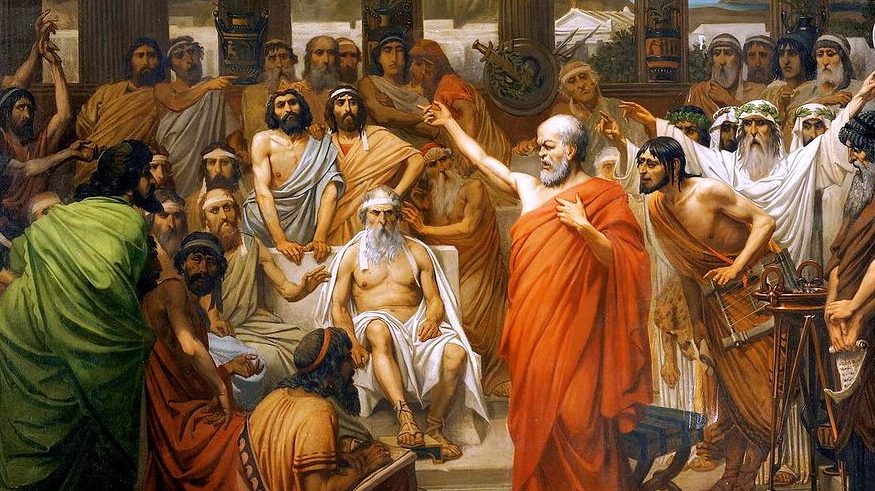A Year of Praxis: What Philosophy Teaches Us About Politics, Rationality and the Pursuit of Happiness
“The owl of Minerva,” Hegel wrote, “takes its flight only when the shades of night are gathering.” A year ago I launched Praxis as a forum for thinking reflectively about contemporary political challenges. The idea was to draw upon salient insights from moral and political philosophy to better understand and evaluate the world of politics: “political discourse for adults,” I called it. As Hegel implies, only when evening comes do we begin to make sense of the day gone by. So today, on the first anniversary of my blog, I pause a moment to take stock of the 107 posts I’ve published thus far in this electronic space.
Social Contract Theory
Glancing through the archive, the first thing I notice is how intimately my blogging holds discourse with my teaching. My posts looking at the Lockean argument for the Affordable Care Act and the Rousseauian overtones of participatory budgeting in New York City both came while I was teaching social contract theory last spring, as did two posts on J.S. Mill: an against-the-grain Milian case for Mayor Bloomberg’s large soda ban and an inquiry into whether it makes sense to engage in debate with genocidal lunatics.
Election 2012
Last fall, I covered the presidential election with posts asking whether Obama is an “imperial president,” rating the speeches at the GOP convention, assessing the impact of Obama’s terrible performance in the first debate, critiquing Romney’s education plan and his “binders full of women” quip but showing the element of truth in the GOP nominee’s “47 percent” gaffe, issuing warnings about computerized voting, and proposing a new format for presidential debates. In the aftermath of Hurricane Sandy, I averred that the tragedy could enhance Obama’s re-election prospects and on Election Day, I pulled some Twitter shenanigans and announced that Immanuel Kant had returned from the grave to endorse Barack Obama.
Reason and Rationality
The materials in my course “Reason and Politics” inspired a dozen or so posts, including a rationality quiz (the most popular Praxis link of the year), an explanation of why failing the quiz shouldn’t alarm you, an analysis of New Yorker writer Jonah Lehrer’s sad fall from grace, a reflection on the hazards of certainty and advice on how to be more reasonable, a look at how our rational faculties are compromised when we’re sad, a open letter to Speaker Boehner pleading for reasonableness, ways to battle irrationality in the voting booth, and, in the runup to the faux-apocalypse on 12/21/12, a cautionary tale on the epistemological quandary of using Google as a portal to knowledge.
Happiness, Identity and Sex
It seems happiness and personal identity have been on my mind over the past year. I drew on Derek Parfit to discuss the metaphysics of Memorial Day, critiqued Will Wilkinson on bungie jumping and the meaning of life, assessed research into whether liberals or conservatives tend to be happier, and took a Kantian approach against the pursuit of happiness. I also wrote a long, personal post on the upside of suffering and the mistake in Daniel Kahneman’s contention that our experiences matter more than how we store them in our memory. Or so I remember.
A few posts looked at love and sex. I weighed in on the debate over Los Angeles County’s mandatory condom rule for porn actors, asked whether having sex and drinking booze are the really the height of human existence, took issue with a New York Times piece counseling against overweening brotherly love, and hammed things up by imagining some dating websites for philosophy buffs on the model of a new site for Ayn Rand lovers.
Equality and Inequality
Back to more serious matters of the polity, and in line with my scholarship and teaching about inequality in American democracy, I wrote a few posts on income and wealth distribution. Last summer I looked at a study showing that Americans prefer the egalitarianism of Sweden to the wealth gap of the United States, challenged readers to come up with a more palatable term than the dreaded “redistribution,” picked a winner (“dehoarding”), examined American misperceptions of the wealth gap and wondered how they would know any better. I also wrote on how to address widespread de facto racial segregation in elite New York City public high schools.
Church and State
Religion and politics, the topic of my 2006 book, showed up in a few posts. I noted how craven Florida state legislators are about Israel and how awkwardly Democrats handle religion, reflected on a Jehovah’s Witness pamphlet on civic and religious duty, wondered why more wasn’t made of Mitt Romney’s Mormonism during the campaign, assessed the pope’s Twitter acumen, asked whether religion is really to blame for the Israel-Palestine divide and proposed a better way to discuss it, wormed my way into the debate over circumcision, and commented on the racy tangle between comedienne Sarah Silverman and an orthodox rabbi.
The Supreme Court
I focused on the Supreme Court in a number of blogs, asking why it is so unpopular among the American people, urging voters to consider future judicial appointments when choosing between Obama and Romney, pointing out inconsistencies in Justice Scalia’s jurisprudence, analyzing Justice Thomas’s brief respite from silence during oral argument and responding to a reader who took issue with some of my claims. I also penned an Isaiah Berlin-inspired open letter to Justice Kennedy on the Affordable Care Act, argued that the ACA would be defunct without the individual mandate and praised Chief Justice Roberts for casting the fifth and deciding vote to uphold Obama’s landmark healthcare law. I also critiqued what appears to be a conservative majority set to nullify part of the Voting Rights Act and set the stage for next month’s oral argument in the same-sex marriage cases and explained why the conservative case against marriage equality has all but evaporated.
I wrote three posts on one of the most contentious issues of the year: an analysis of the nightmarish movie-theater massacre in Aurora, an Ecclesiastes-inspired reflection on the senselessness of the slaughter of schoolchildren in Newtown, and a thought about what Jesus would do about gun control.
&c.
In the potpourri department, I looked into Karl Rove’s insane analysis on election night, asked whether presidential mandates are real, defended irony in the face of a withering critique at the Stone, wrote on the lead-up to the fiscal cliff and the tax deal that averted it, compared a blind Chinese dissident to Socrates (and wondered whether he’s serious about wanting to return to China), warned of a sinister GOP strategy to take back the White House in 2016, asked why Americans claim to prefer cockroaches to Congress, explored the 100-year GOP allergy to income taxes, came out against the running of the NYC marathon in the wake of Sandy (and noted the role of public opinion in achieving the impossible: changing Mayor Bloomberg’s mind), critiqued the drive to end National Science Foundation funding for political science research, and named John Rawls as President Obama’s philosophical muse.
The Point of Praxis: Education
Taking on Praxis has kept me on my toes and given me an exciting forum for thinking through some tough, important issues. It has been a refreshing change from the ponderous pace of academic publishing, with more immediate rewards and a wider, more diverse readership. But as much as I enjoy blogging, my day job and my main passion remain in my classroom at Bard High School Early College, a New York City public secondary school where the ideas in these posts are inspired, challenged and tossed about. In a recent post, I reported on the takeaways and lessons my students drew from our study of Plato, Augustine, Dante and others, and over the year have recruited three students to adapt their own excellent essays for Praxis. Last summer, Nika Sabasteanski exposed the anti-enlightenment strands of the Romney campaign; in the fall, Zane Friedkin channelled Kant to build a moral case against drone warfare (which I responded to in this post); and most recently, 16-year-old Priya Dieterich wrote the lead Big Think lesson of the day, “Misogyny and the Law: Confronting America’s Rape Culture.”
The vibe in my school is friendly, free and intellectually rich, in part because standardized tests play such a small part in the zeitgeist of the place. As parent to two elementary school age children, I am well aware this is not the case everywhere. I have examined the testing culture in the United States, discussed the powerlessness of teachers who lament this environment but cannot safely resist it, pointed out the role that humor and creativity can play in the classroom and wondered whether standards-based curricula do enough to develop children into citizens.
Thinking back over all these posts — and the articles I have been writing for the Democracy in America blog at the Economist, where I have been a contributor since last August — I am grateful to everyone who has read my work, shared links, responded to my writing and taken me to task in the comments and in private correspondence. I am also thankful to Dan Honan, the editor who gave me this opportunity at Big Think and has been so encouraging along the way. Stay tuned: more Praxis is on its way!
The Five Most Popular Praxis Posts (March 2012-March 2013)
1. How Rational Are You? Try This Quiz
2. Why Do Americans Have Less Vacation than Anyone Else?
3. Sex, Booze and the Meaning of Life
4. Vaginas Invade Tampa
5. Why Do Americans Tolerate Extreme Wealth Inequality?
Seven More of My Favorites
1. How to Be More Reasonable
2. Jonah Lehrer’s Downfall and the Hazards of Genius
3. The Unholy Circumcision Debate
4. The Shred of Truth in Romney’s “47 Percent” Gaffe
5. The Demise of the Case Against Same-Sex Marriage
6. The Upside of Suffering
7. Dating Websites for Love-Seeking Philosophy Buffs





